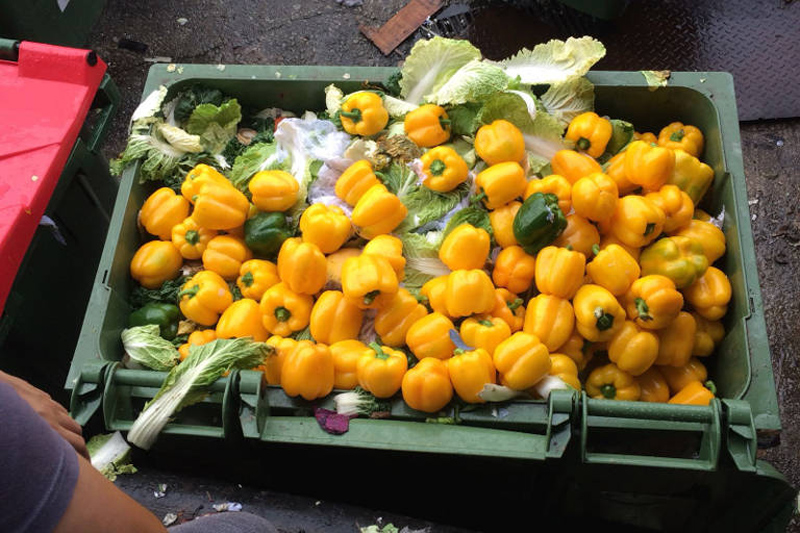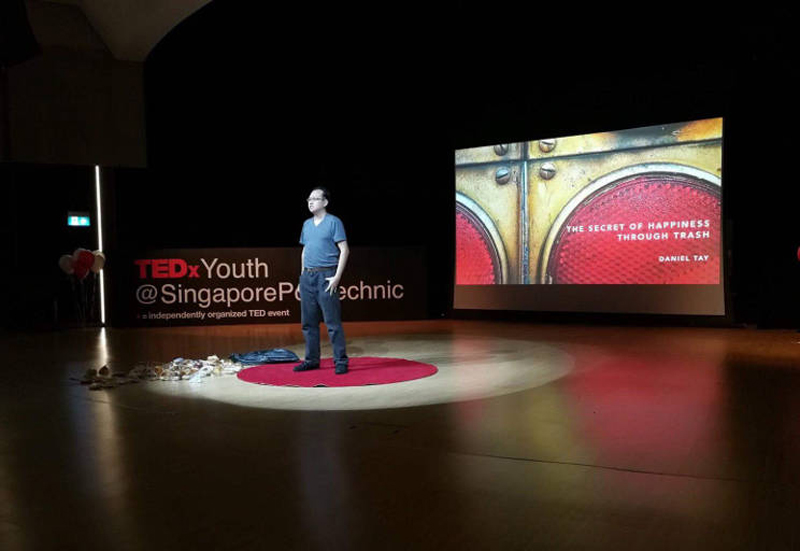This man spent only $8 on food in 2017, here's how he did it

Is it possible to only spend $8 on food for one whole year? Well, you may not even need to fork out a single cent if you're willing to do some digging around.
I'm 10 minutes into meeting Daniel Tay for the first time when he whips out a Burberry handbag and pushes it towards me.
"You want? You can have it!" he says. I politely decline. "Nobody wants it because it's too heavy," he sighs. "Maybe you can give it to your editor?"
The bag isn't brand new. In fact, he found it in the trash.
Daniel is a dumpster diver. He scavenges bins for edible food and usable items. You may have heard of him before - The Straits Times interviewed him late last year when they shone the spotlight on dumpster diving.
But Daniel is also a proud freegan - a person who rejects consumerism and minimises waste to help the environment. The 38-year-old has his own candid definition, though.
"A freegan is someone who spends very little money. He tries to get everything for free," he says.

Dumpster diving vs freeganism
While the terms are sometimes used interchangeably, not every dumpster diver is a freegan, and not every freegan dumpster dives.
"Many karung guni men go through dumpsters, but they're not freegans. Why? Because instead of using the stuff they find for their own purposes, they sell them to earn a living," explains Daniel. "Then there are freegans who don't dumpster dive. They forage for food or make their own things instead."
"Freeganism is a lifestyle. A philosophy. Dumpster diving is an activity. It's just a matter of [choosing] what makes sense for you," he adds.
According to Daniel, it makes sense to dumpster dive in Singapore because a lot of the things found in trash bins here are in good condition. It would be harder to do in other countries because "the trash is really trash".
Each month, Daniel only spends money on necessities such as bills, investments and a mortgage. While he gets food for his cats, he rarely buys meals for himself. In fact, he spent a grand total of $8 on food last year.
How it all began
Daniel has never actually been in a position where he needed free stuff to get by - he has a job as a financial planner. But a chance meeting with a stranger in November 2016 changed his life. He was at an Honesty Circles event, where people have conversations about money, when he met a guy called Colin.
"Some 20 to 30 of us were talking about giving up a stable paycheque to pursue our passion. But when it was Colin's turn, he was, like, 'I'm in my late 40s, I'm retired and I only spend $100 a month. I don't have to worry about money because I get everything for free.'" The $100 Colin spent was solely on bills.
"I was like, 'How?' I'm a financial planner. A very detailed one, at that. And in order to survive in Singapore, you need a minimum of $1,500 a month. I wanted to know more, so I went to talk to him."
At that time, Colin had been living as a freegan for a year. He had learnt about freeganism from the Internet and, aside from dumpster diving behind shops and supermarkets, he collected unwanted food from neighbours.
After talking to Colin, Daniel was excited to try three things he'd previously never imagined doing: ask his neighbours if they'd give him unwanted food such as expired food and leftovers, dumpster dive, and rummage through trash under void decks.
The journey to freeganism
All of Daniel's "projects" went much better than expected. His neighbours were more than happy to give him the food they otherwise would have thrown away and even thanked him for saving them from wastage. By December that year, they were hanging unwanted food on his door on a daily basis
"It hasn't stopped since. I wake up to food outside my door every morning," he says. But free food isn't the only takeaway from this - Daniel has also grown much closer to his neighbours.
"Now, I know what makes them happy or sad. We look out for one another as neighbours are supposed to."
He was also able to gather so many edible fruits and vegetables (including apples, bananas, watermelons, cucumbers, onions and carrots) from dumpsters that his fridge was filled to the brim, so he gave the extras to neighbours, friends and family. When even they had an oversupply, he had to take a break from dumpster diving.
Daniel has never tried looking for meats because they're "trickier" to deal with, but points out that he gets a nice supply from his neighbours anyway.

He also found such an assortment of products in or around bins under void decks that over the past year, he hasn't spent any money on items such as toiletries (he says people throw away a surprising number of half-used shampoos and soaps) and clothes (he often finds still-wearable high-street clothes, bags and shoes).
His other finds include household appliances and portable chargers, and he even found a working PlayStation 3 console once.
And if you're wondering, he also wears socks and underwear that have been binned. To him, there's nothing some water and Dettol can't solve.
"Basically, anything you can buy in a mall, you can find at the void deck," he offers. "More often than not, the things I find are in better condition than what I have at home, so I just do the natural thing and upgrade."
His find with the highest dollar value so far? A Prada handbag. He's actually found all sorts of other branded bags - and he knows they're real because he learnt how to tell. However, their authenticity doesn't really matter to him.
"It's important to remember that a fake branded bag is still a real bag. And you don't throw away a bag just because it's not a real Prada when it can still be used," he explains.
The hoarding issue
It's no secret Daniel has an overabundance of things - he regularly posts pictures of the crazy amounts of stuff he finds on his website (freeganinsingapore.wordpress.com). He's also well aware that his lifestyle is anything but normal.
"The life we freegans lead is a bit ridiculous," he says with a grin. "I don't drink, so I use vodka and rum to clean my stuff. I also use Ralph Lauren t-shirts to clean my tables because the fabric is nice and absorbent," he explains.
"I don't use string to tie stuff together. I use earphone cables because I just have so many."
Daniel acknowledges that dumpster divers and freegans are at risk of becoming hoarders. But he points out that when that happens, it's not because of the activity, but the personality.
"If they hoard, it's because they're hoarders to begin with. It comes from a scarcity mindset. You fear you don't have enough, so you end up with too much," he says. "It's not a bad mindset to have, but when you have a scarcity mindset and an abundance reality, it's a problem."

The good news? The overabundance has also allowed the freegan community to share their finds with charities. They've donated plenty of fruits and veggies to local soup kitchens such as Free Food For All and Willing Hearts. The donors always make sure that these organisations know where the food comes from beforehand.
Daniel points out that while there are people who become freegans mainly so they can give to charity-like Colin, who is now his mentor-it was never his main purpose.
"People become freegans for three reasons: they want to save money, they want to save other people or they want to save the earth," he says. "My initial motivation was to get free stuff and save money. Now that I no longer worry about money, I care about reducing waste. I don't have that strong a charity streak."
And though he used to dumpster dive every day, or at least several times a week, these days, he only does it occasionally. Now that many people know he's a freegan, they regularly drop things off at his place.
"I'd still dumpster dive for fun, but there's nothing I want or need anymore. Everything I have, I didn't even know I wanted," he adds.
The real reason behind it all
But just what is Daniel saving all this money for? After all, he doesn't have kids. And it seems like there's nothing he really needs to spend on.
"I've been spending it on a two-year break from work," he clarifies. He still manages existing clients, but doesn't go looking for new ones.
"When you're working day in, day out, you can become really consumed by it, so you should take a year off work and see what happens," he explains. "When I stopped working, I experienced a loss of identity. But it was a time for me to go, 'Who am I?'"
It becomes clear that there's more to Daniel than just being "cheap". He doesn't pick up free stuff just so he doesn't have to work. To him, saving money allows him to buy time and freedom, which he reckons are the "most costly things".
He wants to be able to live his life doing the things he wants to do, which include trying new things, supporting events he believes in and managing the local freegan community.

Given his active role in the latter, Daniel has become a spokesperson for the movement. In fact, just a few months ago, he was invited to give a TEDx talk at Singapore Polytechnic.
"Did I think that I'd be giving a TEDx talk when I first started digging through trash a year ago? No!" he laughs.
Another thing that prompted Daniel to dive headfirst into the freegan lifestyle is that it's less risky to do it now than when he's older.
"I don't want to wait till I'm 60. At least now, if I need money, it's easier to go back to work," he says.
"People work because they need money, which they think buys happiness. But no, money buys convenience," he opines. "When you're not working or spending money, you'll find that life really slows down."
As our interview comes to an end, Daniel opens a crumpled McDonald's paper bag that's been sitting on the chair for the past 90 minutes. I imagine it contains nothing more than scraps, but he instead pulls out a wrapped, untouched red bean pie that, at the time of writing, has just been added to the menu.
You know, this whole freeganism thing may be "ridiculous" - in an almost unbelievably good way.
This article was first published on CLEO Singapore